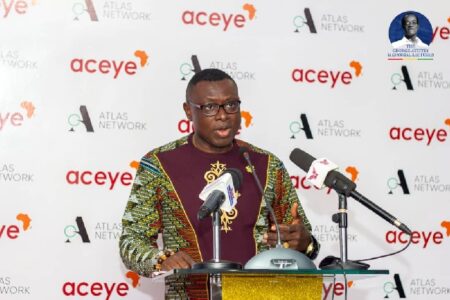Prof Enoch Opoku-Antwi has strongly denounced the poor sense of timekeeping in Africa, specifically in his home country Ghana.
The Associate Dean of Business Administration, Academic City University College, Haatso-Accra, argued if the “culturally-based” practice would change, it would take leaders from all spheres of local life to model it.
Apart from cultural underpinnings, he said the quality of infrastructure could also impact a people’s sense of timekeeping, eventually impacting their development for better or for worse.
Prof Opoku-Antwi was the keynote speaker at the 2024 Prof George Ayittey Memorial Lectures organised by the Africa Centre for Entrepreneurship and Youth Empowerment (ACEYE), Thursday, October 26, 2024.
He stated, naturally, “nobody wants their time to be wasted,” and thus, “all over the world, timeliness is everything”.
The problem
“My observation here [Ghana, Africa], unfortunately, is that we honour those who are late more than those who are early,” he underlined, explaining: “We ask those who are early to wait a little bit for those who are late, to come. That’s not how it’s supposed to be.”
He highlighted how “at events, the chiefs and political leaders who are supposed to be there first, will sit in their cars or come late, making sure that everybody is seated before they come because they want to be glorified. That’s not how it’s supposed to be”.
“Money some may have more than others but time, we all have equal time. You cannot waste somebody’s time,” he admonished.
The solution
Prof Opoku-Antwi advocated a culture “where those who are habitually late to work are fired” and “those who are late to events arrive to see the event is already finished.
“I want our leaders to come to events on time – traditional, political and religious leaders, alike. I want them to be role models, setting an example so that everybody will show up on time.”
“This is how people will begin to learn the importance of time,” he emphasised.
Enhancing productivity
Asserting that “timeliness is a key component in building any nation,” and “if you play with time, time will play with you,” the academic came to the role quality infrastructure plays in fostering a healthy timekeeping culture and promoting productivity and development.
He echoed a thought by a guest of his who once bemoaned the nature of roads in Ghana, saying: “Your roads reflect your thinking.”
To explain, Prof Opoku-Antwi cited: “The reason in Atlanta, for instance, there are eight lanes here and eight lanes there is that they want people to be efficient, and go to work without being late. If you want me to be on time, what are you doing about the road network?”
Counterproductivity of politicisation
In Ghana, “our road network is not good, and when people talk about them, it is politicised. When the roads are good, do we care who built it? When galamsey stops and the water is good, do we care who did it? Let’s all begin to think about the common good,” he admonished.
Prof Enoch Opoku-Antwi urged political leaders to place national interests above partisan interests when embarking on infrastructural projects like roads.
Source:classfmonline.com

